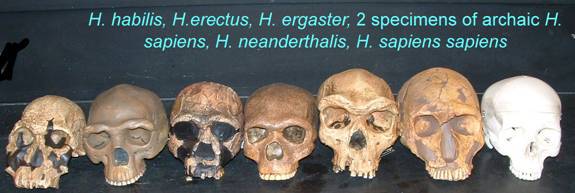Job 33:6
Well-Known Member
- Jun 15, 2017
- 9,623
- 3,242
- Country
- United States
- Gender
- Male
- Faith
- Christian
- Marital Status
- Married
- Politics
- US-Republican
First, not all creationists believe in young earth. When God first created light, there is no sun so the concept of 'day' on that first day is up for interpretation. God said a thousand years to him is a day, which basically means a billion year or a day is no difference to God.
Second, from your post below, what is the mutation rate (i.e. change per million year or generation)? And just because we observe small mutations, does it mean small mutations can actually amount to bigger ones? Have we ever tested to show that what small mutations can amount to (i.e. have we ever observed a single celled organism mutated to multi-celled organism)?
I know not all creationists are young earthers, which is another demonstration that, a lot of this discussion is coming down to scriptural interpretations.
For the second part, you really should give some kind of credit to the proposed test. To be fair, it is a scientific test, it has all the components, the hypothesis, the process and procedure that derives the prediction and result, and it has results derived from an objective procedure that either support the hypothesis or not. It fundamentally is a good test.
I made a post shortly ago directed at mouse. And in it, I said to him "there is probably no literal test that you could ever see that would lead you to believe the earth is old". To be honest, this is probably a true statement. And I would ask the same to you with respect to evolution. Is seeing a fish transform into a tetrapod the only thing that could allow you to believe it? Is having a time machine the only possible way which you could observe what is needed to believe it?
I think if you guys were even half as critical of your own propositions, as you are of the age of the earth or evolution, you would probably find it pretty easy being a theistic evolution proponent, on the condition that deep seated literalist views of scripture are not something that take precedence over scientific tests like the one listed above.
Ill tell you though, just because its on my mind. We have seen, as you probably know, small mutations amount to animals growing additional legs, and chickens growing teeth, and animals morphologically changing. Mutations can result in huge morphological changes in life.
Also, as far as anyone is aware, there is nothing that would stop a life from mutating. Its not like an species says "ok, ive mutated enough, no more changes to my DNA God, thank you". Really, id say its harder to propose that mutations dont add up, than to say that they do add up, simply because there is nothing that anyone is aware of, that would stop them from doing so.
And if every individual is a new individual, its not like a single animal needs to undergo an infinite number of mutations. If 4 billion years pass, and you have a single generation for each year, or lets say post cambrian (500 million), thats 500 million generations worth of mutations. Even if each generation only experienced 1 mutation (im pretty sure we all experience many in our lifetime), that would be 500 million mutations. But if every generation only experienced one microscopic change, its likely theyd never know it (unless they were born with a clear visual abnormality). Unless of course they lived for a 100 million years to see them add up.
The alternative involves the test proposed above. In a situation where we dont have a time machine to go look, what is the alternative? Well, use our mutation rates to predict where the fossils are.
Last edited:
Upvote
0




